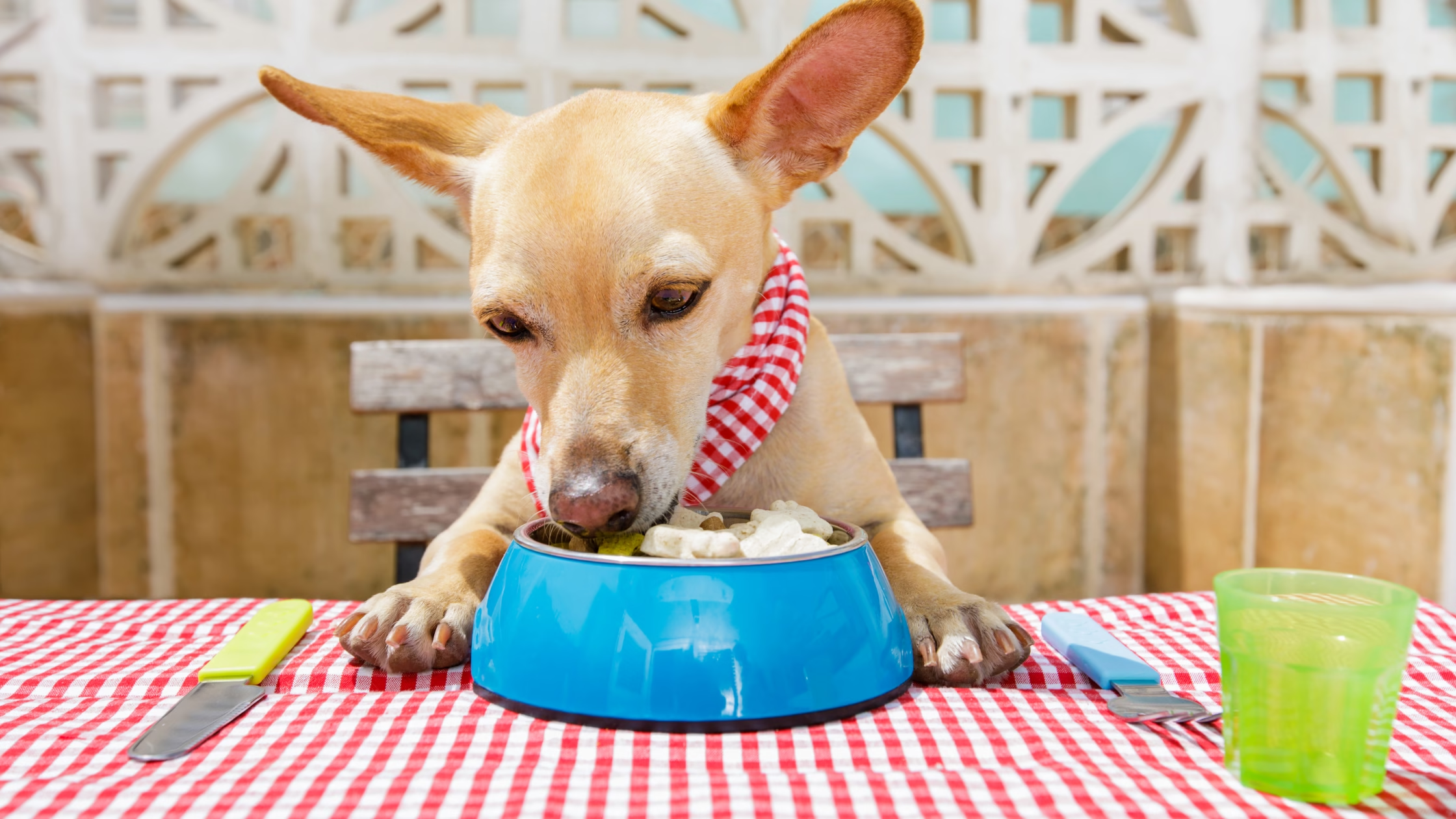Dogs are known for their voracious appetite and love for food. Still, sometimes they can exhibit unusual eating habits, such as only eating at night. This behaviour can be concerning for pet owners and may indicate an underlying issue that needs to be addressed. This article will explore why a dog may only eat at night and what you can do to help.
Why Does My Dog Only Eat at Night? Understanding your dog’s regular eating habits
Understanding your dog’s regular eating habits is an essential first step in determining why they may only be eating at night. It’s typical for dogs to eat two or three meals per day, but some may prefer to eat smaller, more frequent meals. Factors such as breed, age, activity level, and overall health can all impact a dog’s eating habits. Observing your dog’s standard patterns can provide valuable insight into their behaviour and help identify changes or deviations from what is considered normal.
Medical conditions that cause night eating in dogs
Medical conditions can sometimes cause dogs to exhibit night-eating behaviour. Some common health issues that can disrupt a dog’s eating habits include:
- Hypoglycemia: Low blood sugar levels can cause a dog to feel hungry, even in the middle of the night.
- Gastrointestinal disorders: Inflammatory bowel disease, exocrine pancreatic insufficiency, and liver disease can all lead to abnormal eating habits.
- Hormonal imbalances: Thyroid disorders and other hormonal imbalances can cause a dog to feel hungry at unusual times.
- Medications: Certain medications, such as corticosteroids, can increase a dog’s appetite and lead to night eating.
Suppose you suspect your dog’s night eating may be related to a medical issue. In that case, it’s essential to consult a veterinarian for a proper diagnosis and treatment plan.
Separation anxiety and night eating in dogs.

Separation anxiety can also cause a dog to exhibit night-eating behaviour. When a dog is separated from their owner, it may experience stress and anxiety, leading to changes in its eating habits. For example, a dog with separation anxiety may start eating more during the night, when they are alone, to comfort themselves.
Other signs of separation anxiety in dogs include destructive behaviour, excessive barking or whining, and inappropriate elimination. Suppose you suspect your dog may have separation anxiety. In that case, it’s essential to seek the help of a professional dog behaviourist for proper diagnosis and treatment.
Dietary changes and feeding schedule adjustments
Dietary changes and feeding schedule adjustments can also affect a dog’s eating habits. For example, switching to a new brand of dog food or changing the type of food being fed (e.g. from dry to wet) can cause a dog to become less interested in eating. Additionally, feeding a dog at varying times or not providing enough food during the day can cause them to become hungry at night.
To help alleviate any changes in your dog’s eating habits, it’s essential to make dietary changes slowly and to stick to a consistent feeding schedule. Suppose you are making changes to your dog’s diet. In that case, it’s also necessary to consult with a veterinarian to ensure that they receive the proper nutrients in the right amounts.
Also Read : Can Dogs Eat Rice Safely? Expert Insights
The impact of treats and snacks on dogs
The impact of treats and snacks on a dog’s eating habits is an important consideration. Treats and snacks can affect a dog’s appetite, leading to changes in their eating patterns. In some cases, overindulging in pleasures can lead to weight gain and an upset in their regular feeding schedule.
It’s essential to monitor the number of treats and snacks a dog consumes and to factor that into their daily caloric intake. Treats and snacks should be in moderation, not replace a balanced and nutritious diet.
It’s also important to consider the type of treats and snacks being given, as some may contain unhealthy ingredients for dogs or may cause digestive issues. Please consult a veterinarian to determine the best types of treats and snacks for your pet based on their needs and health status.
The impact of exercise on dogs
The impact of exercise on a dog’s eating habits is significant. Regular physical activity can help to increase a dog’s appetite and stimulate its metabolism, leading to healthier needs and regular eating habits.
Physical activity can also help to alleviate boredom and relieve stress, impacting a dog’s eating habits and contributing to night eating. Exercise also helps to burn off excess energy, making a dog feel more relaxed and calm, which can help to promote a regular eating schedule.
It’s vital to incorporate regular exercise into a dog’s routine, tailored to their needs and energy levels. This can include a daily walk, playtime, or interactive toys. However, it’s important not to over-exercise a dog, as this can lead to physical and mental exhaustion, impacting their overall health and well-being.
Consult with a veterinarian to determine the right amount and type of exercise for your pet based on their age, size, and health status.
Importance of feeding the right amount to your furry friend.
The importance of feeding a dog the right amount cannot be overstated. Overfeeding or underfeeding a dog can lead to changes in its eating habits, including night eating.
Understanding a dog’s individual calorie needs must be based on factors such as age, size, activity level, and health status. A balanced and nutritious diet tailored to a dog’s needs is essential for maintaining its health and well-being.
Overfeeding a dog can lead to weight gain, contributing to health issues such as obesity, joint problems, and reduced life expectancy. Underfeeding a dog can lead to malnutrition and a weakened immune system.
Please consult a veterinarian to determine the right amount of food for your pet based on their needs and receive recommendations for a balanced and nutritious diet. Regular check-ups and weight monitoring can help ensure that a dog gets the proper food for their health and well-being.
Environmental factors
Environmental factors can significantly affect a dog’s eating habits, including night eating. Changes in a dog’s routine or environment, such as moving to a new home, adding a new pet or family member, or changing the owner’s schedule, can impact a dog’s eating habits.
Noise, such as fireworks or thunderstorms, can also impact a dog’s eating habits and lead to stress-related behaviour, such as night eating. A dog’s living environment, such as the location of its food and water bowls, can also impact its eating habits.
It’s important to minimize environmental stressors as much as possible and to provide a calm and stable environment for a dog. Providing a safe and secure space for a dog, such as a cosy bed or crate, can also help to alleviate stress and promote everyday eating habits.
Consult with a veterinarian to discuss potential environmental factors that may impact your pet’s eating habits and receive recommendations for minimizing stress and promoting a stable and healthy environment.
The impact of ageing in dogs.
The impact of ageing on a dog’s eating habits is an important consideration. As dog’s age, their metabolism may slow down, leading to changes in their appetite and eating habits.
Older dogs may also experience changes in their sense of smell and taste, which can impact their appetite. Dental problems, such as tooth loss or gum disease, can also make it difficult for older dogs to eat, leading to changes in their eating habits.
It’s important to monitor an ageing dog’s eating habits and promptly address any changes. A balanced and nutritious diet tailored to an older dog’s needs can help maintain their health and well-being. Regular veterinary check-ups, including dental exams, can also help prevent and address any health issues impacting an ageing dog’s eating habits.
Please consult a veterinarian to determine the best diet and feeding schedule for an ageing dog based on its needs and health status. Regular monitoring of their eating habits and weight can help ensure that they receive the proper nutrition for optimal health and well-being.
Tips for managing night eating in dogs

If your dog only eats at night, several tips can help to manage this behaviour:
- Establish a routine: Create a regular feeding schedule and stick to it, even on weekends or holidays. This will help to regulate your dog’s hunger cues and promote everyday eating habits.
- Avoid snacking: Limit treats and snacks between meals, as this can disrupt your dog’s hunger cues and contribute to night eating.
- Provide interactive toys: Provide your dog with interactive toys and puzzles to keep them mentally stimulated and to distract them from seeking food during the night.
- Address separation anxiety: If your dog’s night eating is related to separation anxiety, consider seeking the help of a professional behaviourist to address this issue.
- Consult with a veterinarian: If your dog’s night eating is persistent and cannot be resolved through diet and behaviour modifications, it may be a sign of an underlying medical condition. Consult a veterinarian to rule out any health issues and receive recommendations for managing your pet’s night eating.
- Provide a relaxing environment: Ensure that your dog’s sleeping area is quiet, dark, and comfortable, as a relaxing environment can help to promote everyday eating habits and reduce stress-related behaviour such as night eating.
It’s important to remember that every dog is unique and may require individualized approaches to manage their night eating. Consult with a veterinarian to receive personalized recommendations based on your pet’s needs and health status.
Also Read : Can Dogs Have Strawberry Jam? The Ultimate Guide with Expert Tips
Conclusion and final thoughts
In conclusion, night eating in dogs can be caused by various factors, including medical conditions, dietary changes, separation anxiety, environmental factors, ageing, and more. Understanding the underlying cause of your dog’s night eating is critical to finding an effective solution.
It’s essential to consult with a veterinarian to receive a thorough examination and to rule out any underlying health issues. Modifying your dog’s diet and feeding schedule, addressing separation anxiety, and providing a calm and stable environment can help to minimize stress and promote everyday eating habits.
In addition, providing interactive toys, limiting treats and snacks, and monitoring your pet’s weight can help manage night eating and ensure proper nutrition. With the right approach, you can help your dog overcome night eating and maintain their health and well-being.
Remember, every dog is unique and may require individualized approaches to manage their night eating. With the proper care and attention, you can help your pet to overcome this issue and maintain a happy and healthy life.







